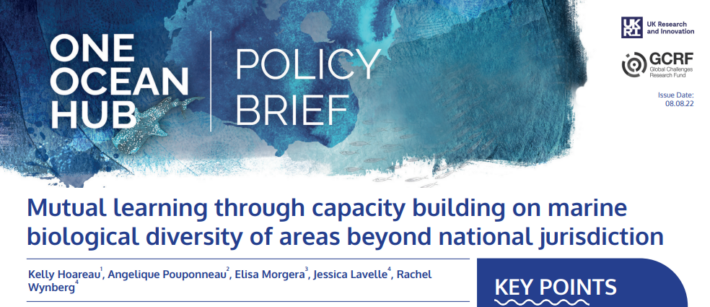Contributing to the UN negotiations of a new “high seas treaty”


In preparation for the latest round of international negotiations on a new treaty on marine biodiversity of areas beyond national jurisdiction (nick-named “the high seas treaty”), Hub researchers have published three policy briefs identifying key priorities for an ambitious and equitable outcome based on insights from marine sciences, social sciences and law from the Global South and the Global North. The briefs drew from ongoing research on the importance of protecting deep-sea ecosystems and their benefits to human wellbeing (which contribute to protect basic human rights), identified inequities in international scientific collaborations and insights on the importance of the ocean genome not only for bio-based discovery but for essential conservation of the ocean.
Each policy brief provided specific textual suggestions for negotiations to consider at the fifth meeting of the Intergovernmental Conference on an international legally binding instrument under the UN Convention on the Law of the Sea (UNCLOS) on the conservation and sustainable use of marine biological diversity of areas beyond national jurisdiction (BBNJ), which convened from 15-26 August 2022 at UN Headquarters in New York.
The first brief underscored the need for mandatory Strategic Environmental Assessments (SEA) to ensure that the BBNJ Agreement contributes to 1) advancing ocean science, 2) ensuring strategic decisions on cumulative impacts to the benefit of more effective implementation of all other elements of the BBNJ Agreement, and 3) contributing to climate change mitigation. To that end, the brief made the case for SEAs to include explicitly Regional Environmental Assessments to collect existing information on marine biodiversity at a regional scale, which is essential to enable environmental management at a scale that is ecologically-meaningful.
The second brief underscored that the new treaty needs to create the pre-conditions for mutual learning and ocean knowledge co-development between countries in the Global North and the Global South, in order to ensure the effectiveness of future cooperation on the conservation and sustainable use of the ocean. This in turn requires understanding of the current inequities in ocean science, and can build on solutions that have been identified and piloted in recent international scientific collaborations. To these ends, the policy brief focused on enhancing provisions on mutual capacity building and technology co-development.
The third policy brief was inspired by a previous collaborative blogposts noting that participation of civil society in the BBNJ negotiations has remained limited and below the standards adopted under other multilateral environmental negotiations, both in terms of participation and access to information. This policy brief underscores that public participation in the future implementation of the BBNJ Agreement is an international human rights issue, particularly with regard to Indigenous and local knowledge holders and children. It provides textual suggestions to ensure that those most affected by decisions on marine areas beyond national jurisdiction can contribute to determine the future of our ocean and all the dimensions of human wellbeing that depended on it.
We remain available to work with national delegations and other stakeholders involved in the negotiations to explore how these textual suggestions that can contribute to the coherence of the new treaty and to the setting of conditions for transformative ocean governance both from the viewpoint of environmental sustainability and inter- and intra-generational equity. Contrary to how international media have portrayed the suspension of IGC-5, this is not a “failure”, but rather a precious and much-needed opportunity to raise the ambition of a future BBNJ treaty.